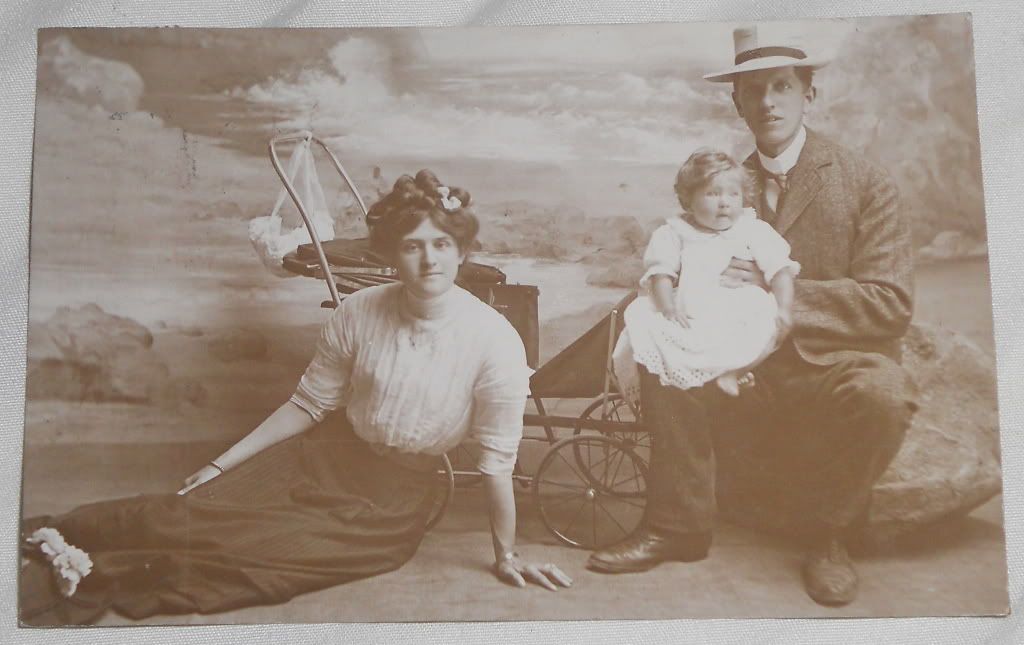 |
E. STUART HARDY (BORN 1870) FROM
THE STORY OF THE FIVE REBELLIOUS DOLLS, C. 1910.
DARLING & COMPANY POSTCARD, donated by Patricia VanAmburg.
|
What is up with these dolls? They look cranky, stressed out. I tried to do some research on their story, to find a copy of this children's book, but I didn't have much luck. I was stuck.
Should the poem for this card focus on the dolls? Maybe the child to whom the rebellious dolls belong. I couldn't settle on the right voice.
Then, I found my personal connection to the drama unfolding in this scene. When I inserted my long-ago self into the story, the poem came together.
Rebellion
When
my child was at last asleep,
a
soldier doll in thumb-sized bearskin hat
marched
to me across the nursery floor
I’d walked all night. He raised
I’d walked all night. He raised
his
toothpick sword, entreated me to flee
with
his band of fed-up dolls
as
if I were a tangle-haired Parisian girl.
I
wanted to run. I did.
I
was a peg doll, out of joint,
the
fine suit of clothes I came with−
gone,
hat crumpled. I froze
and
so they left me, traveled the world.
Sometimes,
they still send
a
postcard home, addressed
to
Big Bad Momma.
Laura
Shovan
 |
| The book's cover. The poem was almost about its author, E. Nesbit, best known for The Railway Children. Her biography is worth reading, even on Wikipedia. |
A
big help -- guest blogger Charles Rammelkamp. A few weeks back, Charles shared postcards from his twin, who often addresses his greetings to “Bad Feller” and “Bad
One.” I borrowed that title for the poem’s final line.
A few
of the poems in my 44 Postcard Project have been autobiographical. In poetry, really in all writing, I shy away from that term. Is “Rebellion” a
true reflection of my life, when my children were small? Even during nursing
strikes and the dreaded Coxsackie virus, I never hallucinated or imagined dolls
coming to life and telling me to escape.
And
yet, there is truth in the poem. Parenting can be a challenge. When the
babies (now the teens) have a particularly awful day, there is that momentary
flash of “What would life have been like if...?”
Speaking
of postcards and the Truth with a capital T, check out writer Michael Kimball’s
postcard project.
 |
| Michael Kimball's latest book. |
“MichaelKimball writes Your Life Story (on a postcard)” was featured on Little Patuxent Review’s blog last summer. Kimball told LPR's Ilse Munro, “It taps into something human and humane, and I continue to
be amazed by what people tell me.
.jpg) |
Kimball
interviews people and writes up their stories, a process he called “intense and
intimate.” The project has become a blog and will soon be a
book.
 |
| Pre-order from Amazon. |
Writing Exercise (Grades 3 and up):
Try Postcard
Life Stories with your students (with sensitivity to pairings).
Skills:
- interview techniques and active listening as students gather information from one another;
- editing, deciding which facts to keep and which to cut, so that the resulting profile of a classmate fits on a postcard.
 |
| Vintage postcard available on Ebay. |
Hi Laura,
ReplyDeleteHaving been a doll-lover, dreamer, story-maker, play-creator as a young child, I loved this. Sort of Velveteen Rabbit-ish when the toys come to life at night. Yet I really like how you combine the reality of motherhood beautifully. And those haughty toys, superior, like our kids who leaves us to travel the world, but still know our nicknames. Wonderful project as I have said, but particularly like this post and all the extras you share. I will be checking it all out. I think you have found and delivered a lovely new writing opportunity. (Not sure its a genre yet, but could be perhaps.....) I am a fan!
Janet F. aka Janet Clare
I will send this to my daughter, Laura. We spent the afternoon together yesterday & spoke of life's changes when the children arrive. She has an almost 4 and a 1 & 1/2 year old-busy, busy, & works at a demanding job. Her husband shares mightily too, but still, in the middle of the night patting a child back to sleep, one might wonder, as you wrote. I continue to love all the connections you've made, & that you are patient about it, too. Thanks for the other link & idea. I will pass this on to those who teach the older students. It would be a great beginning of the year activity! Thanks!
ReplyDeleteI am the proud recipient/owner of Poetry Postcard #35 and I just love it. This whole project has been quite amazing, and I'll be sad to see it end (though something tells me you won't be).
ReplyDeleteThank you so much! Hope you don't mind I've posted the postcard on FB. :)
(The life on a postcard book looks fabulous.)
Thanks for stopping by, everyone. Janet -- I am all for the postcard poem genre. Really, it is a form of ekphrastic poetry, but I've found it to be a good daily writing practice. Easier for me to write "to" something each day.
ReplyDeleteLinda -- I'm honored that you're sharing this poem with your daughter. In many ways, parenting gets easier as the children get older. I like your idea to do the postcard interviews at the beginning of the school year.
Renee, thank you for sharing the card. As I mentioned, it's really fun to see the postcards after their travels -- a little beat up looking, with their cancellation marks. I'm glad this one made it all the way to Italy!
ReplyDelete